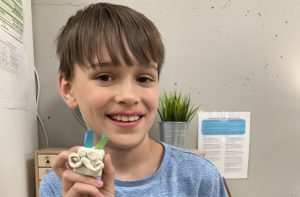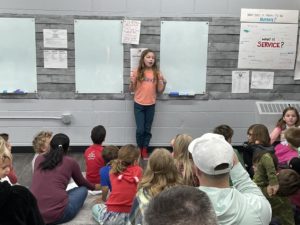Yesterday, as I was typing away on my computer outside of the Spark Studio room, I couldn’t help but notice the peacefulness and focused energy of our 3-7 year-olds just feet away from my desk. “One word,” our Spark guide commented to me as she stuck her head out of the door with a glimmer in her eyes. “Normalization.”
Normalization, Maria Montessori declared, “is the most important single result of our whole work.” The Absorbent Mind, (Chapter 19).
Children find joy when they unlock their ability to concentrate and work freely in the prepared environment, exercising self discipline and peace. And yet, it takes time and growth through different stages in order to achieve this milestone.
Take Liam, for instance. When he came to us 7 months ago, he was filled with anxiety. His nervousness to talk and express his feelings acted like a barrier of protection all around him. He never went without his orange blanket, eyes peeking out from over the top. I could sense his heart asking, “Am I safe here? Do I have friends? Am I accepted here?” and the insecurity he felt in the answer caused him to act out, trying to prove the answer was what he feared – a resounding “NO”.
He sought attention with his actions. Yelling out at random times. Bopping friends on the head. Taking a work from someone without asking. It was the most comfortable way he knew how to get the attention he craved. After all, it can feel more scary to try something new, fail and feel rejected than stay where it is comfortable – affirming the negative story in one’s head – and staying inside that story as a victim.
Yet, hope was not lost. Love was still there, waiting.
Waiting like a seed that quickly springs up from the dew soaking down into the dirt; it can’t help but grow.
At times I’d move a little closer to step in, yet our Montessori guide would put out her hand to say, “just wait…let’s see what the heroes will do. Give it time.”
The key to unlocking Liam’s sense of normalization wasn’t correction at first. It was love.
We rallied the whole studio to show Liam what it looks like to be a friend, ignoring the negative behavior as much as possible and showering the learners with growth mindset praise. “Wow! I see how gracious you are being to Liam. That’s what I call friendship and being a leader. As you show him such kindness, over time he’ll learn how to be a good friend to you too!” And the heroes rose to the challenge to help Liam see that he is accepted, loved and welcome in their community.
Each week was a little better than the last. As Liam started gaining traction, his aversion to being around others grew to a deep love of being in the studio – and a deep love for all of the friends he was discovering.
When we saw this happen, we knew it was time to adjust our focus slightly. Liam needed a challenge.
After all, his name means “strong willed warrior who leads the people to victory.” He lives up to this name. Now that his heart felt more secure, he was ready.
I first noticed this when we were headed outside and he had unfocused energy. “He needs a challenge,” I thought. So, I asked if he would like to carry the VERY heavy water bottle we took outside each day to refill everyone’s water bottles. Immediately he stopped what he was doing and hugged the heavy bottle with such pride and ownership.
In the studio, we began to hold him accountable to his choices – offering the choice to take space in the calming corner to feel better or to engage in conflict resolution with his friends. We waited patiently for him to choose and held him accountable when needed. He even earned jobs at home for the biggest moments when he refused to listen or make a powerful choice.
After a few months of sticking to our guns, in a kind, patient, yet firm way, he began to respect boundaries. We noticed it first at home – and then as he began to respect the boundaries at home, he began to respect the boundaries of the studio as well.
Such a beautiful transformation we’ve seen. We’ve witnessed first hand how the Acton journey of growth requires a partnership between parent and guide, for there must be alignment in philosophy at home and at school in order for breakthrough to occur.
Now, Liam owns his choices and his mistakes. By his own accord he chooses to take space out of the studio when needed until he is ready to respect the guardrails. He is sharing his thoughts and feelings with others – and isn’t afraid to speak in front of the whole community at Exhibition. He has discovered his identity as a leader – and is owning his role to model positive choices for others who follow him.
Just the other day, Liam came over to me and said, “I want to try the challenge of keeping my blanket at home now.”
That was entirely his idea.
After the initial shock, I teared up and gave him a big hug. “I’m so proud of how you are choosing to challenge yourself to grow,” I whispered.
I wiped away the tears and our Montessori guide smiled knowingly at me. After all, it’s true – Liam is my son.
We’d been on quite the journey together to reach this point. And he had done it. He found his way to normalization. Yet he didn’t do it alone – each hero in the studio chose love and paved the way for him to get there.
As he tucked his blanket in his backpack to take home at the end of the day, I saw he had put on a new identity – that of a leader. He marched back into the studio with strong shoulders and a gleaming smile – orange blankey no longer fitting with who he saw himself to be.
Thank you, Liam, for showing all of us just how transformational Love is.




